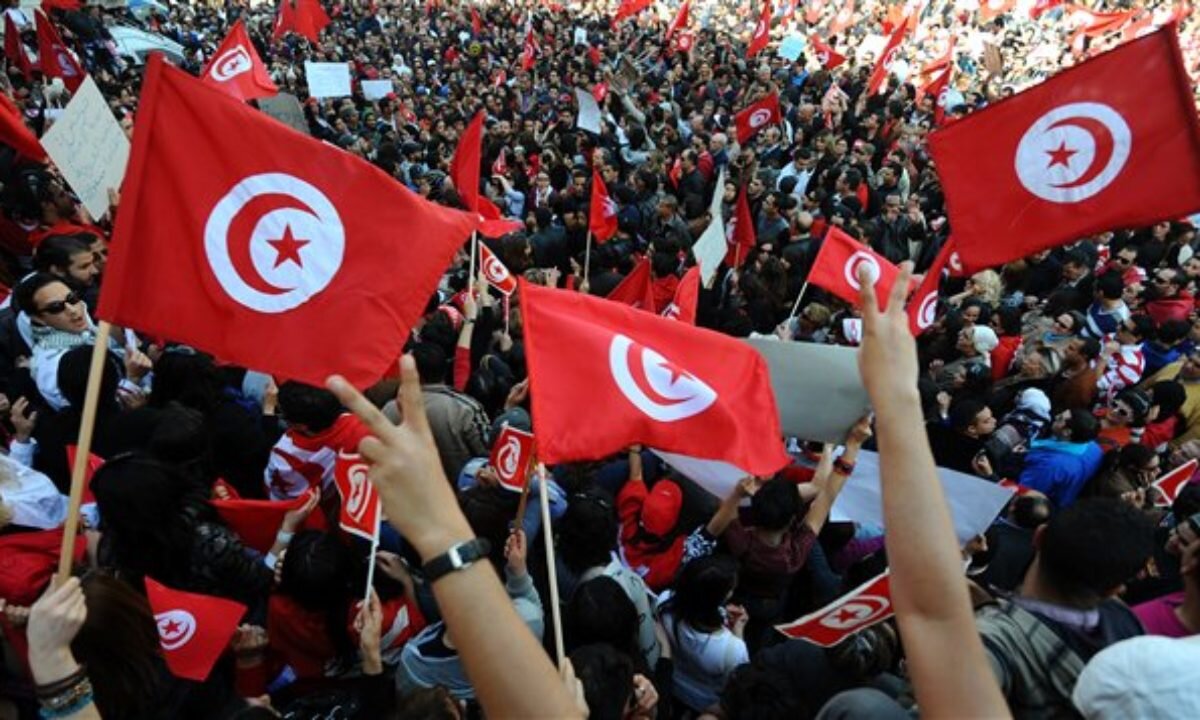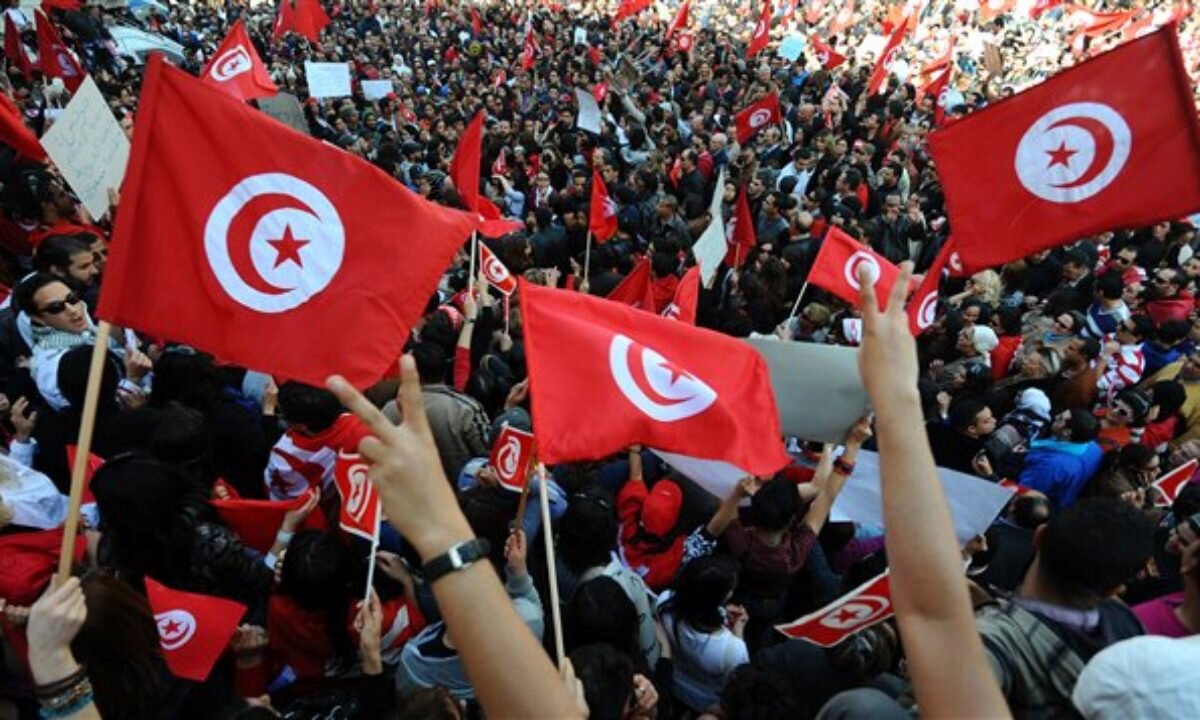
On Sunday, July 25th, after a day of nationwide protest, Tunisian President Kaïs Saïed announced the dissolution of Parliament and the government of Prime Minister Hichem Mechichi.
Iason Athanasiadis
The Tunisian democratic rollercoaster has gone into overdrive, seeking an authoritarian antidote to systemic demise. But can reform come through suspending democratic processes?
A young woman clasps her heart as she swings around on the street, then collapses against a wall: “My husband’s in prison and my newlyborn’s still held in the hospital,” she gasps as bystanders shuffle forward in the over-40 degree heat to offer her water.
In the nearby market’s vegetable stalls, customers shrug hopelessly at the unaffordable prices of foodstuffs that continue rising. Civil servants loiter outside the ministry district waiting to be allowed back in by the security forces currently occupying them.
Meanwhile, scarce oxygen cylinders are divided one to every three patients in un-airconditioned medical clinics in this North African country with the highest Covid-19 death tolls.
Tunisian citizens have been suffering from the consequences of their state’s inability to guarantee both more abstract concepts such as social justice alongside cornerstones of the social contract like a functioning health system, stable prices for essentials, or even potable tap-water. Their troubles — and hopes that Tunisia’s post-revolutionary deadlock might be broken — are what prompted them to support a political intervention by their President that looked a lot like a coup.
“The past decade proved we’re not prepared for democracy,” said Arbi, a taxi-driver, “so if the President changes the system from parliamentary to presidential, I don’t see a problem with that.”
“We’ll never allow them to flee again”
The Tunisian capital has been baking in a summer-long heatwave, a Covid-19 pandemic surging out of control since May, and rapid political developments as of 25 July, the anniversary of the Tunisian Republic on which President Kaïs Saïed chose to unleash a campaign labelled an anti-corruption drive by some and a power-grab by others. The combination of an evening curfew beginning well before sunset at 7pm (it was moved to 10pm in the second week) and sizzling days, tampered any appetite for active resistance to the avalanche of firings, detentions and financial investigations being announced on a daily basis.
Operating from the presidential palace in Carthage, and flanked by chiefs of the Army and the security services, Saïed initiated his dramatic political intervention by sending the Army into the Parliament, lifting lawmakers’ parliamentary immunity, and neutralizing the Judiciary by assuming control of the Office of the Chief Prosecutor. Hundreds of politicians, businessmen and public figures were banned from travel outside Tunisia.
“We learned our lesson after the 2011 Revolution,” said one Tunisian who didn’t want to be named, in reference to former dictator Ben Ali who fled to Saudi Arabia, “and we’ll never allow them to flee again.”
But even despite widespread popular support for his intervention (the first opinion poll released registered four in five Tunisians approving his actions), and a sense that he is seeking to pull his republic out of a death spiral of corruption, the narrative of surgical reform soon began to leak into glimpses of authoritarianism. Within the first week, international journalists arriving at Tunis International had their equipment confiscated, several parliamentarians and a judge were detained or subjected to house arrest (although their arrests were allegedly related to pre-existing sentences from which the waiving of their parliamentary immunity no longer protected them), and claims emerged that sacked Prime Minister Hisham Mechichi agreed to resign only after being threatened and physically abused during a bruising Sunday meeting at the Presidential Palace. Although Mechichi later issued a public denial, he has remained out of sight ever since. A four-day presidential visit to Egypt in April to which Egyptian military dictator Abdelfattah Sisi accorded great importance may have laid the scenography for Saïed’s challenge, amid claims that Egyptian advisers are also present in Tunis.
The optics got stranger when a New York Times team, detained while reporting in the working-class Tunis neighborhood al-Tadamun on Friday, reappeared hours later in the company of the President wearing their formal best in a gilt-edged protocol room. Saïed recited the American Constitution’s introduction in French, waved a print-out while lecturing them on its contents, and assured them they would be free to practice their profession (even though some of their equipment had been confiscated too).
“I don’t trust Kaïs Saïed but I think this is an ‘opportunity’ Tunisian civil society can seize and expropriate from the President and the Army,” said Iheb Guermazi, an academic and researcher at MIT. “Without such acts of popular active appropriation of this chaos, with the amateurism Saïed is currently showing, and the increasing foreign pressure coming to restore institutions, I’m doubtful things will get better soon.”
So how did Arab Spring initiator and success story Tunisia enter this new twist in its decade-long journey?
An unlikely rebel
President Kaïs Saïed is an academic and constitutional law expert who emerged from political obscurity on a groundswell of youth support in the 2019 election to defeat a tainted media mogul. Saïed was brought to the fore by expectations he would reform a 2014 Tunisian Constitution that was in itself the product of an earlier political crisis that brought the country to the brink of civil strife.
Saïed is replete with contradictions: a wooden, media-shy figure whose declamatory classical Arabic did nothing to reduce his popularity with a Tunisian youth disillusioned with its political class; he shut down the Muslim Brotherhood despite initially being suspected by secular Tunisians of being a crypto-religious conservative; and justified his frontal assault on his country’s political life by leveraging the broadly-interpretable Article 80 of the Constitution, which permits a head of state to take unspecified exceptional measures in the event of an “imminent threat.” Last Sunday, the “imminent threat” was limited violence accompanying street protests, although supporters have glossed over this by focusing on the metaphorical threat of a country on the verge of collapse.
A postmodern coup?
In front of the Parliament, housed in the Ottoman-era beylical Bardo Palace, there are no al-Nahda supporters in sight. Armored military vehicles and police vans are parked inside and outside of the closed main Parliament gate. Police personnel and locals sit in a shaded cafe across the way, exchanging news and gossip about the latest development. A Tunisian flag covers an American-donated Army vehicle parked in such a way as to block the main gate.
The flag is a reminder of the rival claims to legitimacy appealed to by the two sides, best captured on the night of Saïed’s intervention, when Rachid Ghannouchi headed to the Parliament to challenge the Army. Finding his way blocked, he pointed to the large lock on the gate and demanded it be removed, but was asked to get permission from the Minister of Defense first.
“We took an oath to protect the Constitution,” a woman accompanying Rachid Ghannouchi, the head of al-Nahda and Speaker of the Parliament, said.
“And we took an oath to protect the Homeland,” shot back the officer, sending the video viral.
While the EU has largely remained on the fence, US National Security Advisor Jake Sullivan called Kaïs Saïed on Saturday and urged him to form a new government and ensure the timely return of an elected government, in a likely reference to the one-month suspension Saïed imposed. Tunisians are convinced that the Muslim Brotherhood is using powerful lobbyists in Washington to swing support behind themselves.
But in Tunis’ quaint colonial downtown, a juice-shop owner on the battered Avenue des Londres minces no words about the head of al-Nahda, calling him a “dog” who should be disposed of. At a technology mall called Gallerie 7, repair technician Abduh believes we are witnessing the self-correcting processes of a little-understood country that renders it an exception to its region: “The Egyptians and other Arabs have no understanding of how Tunisia functions. We have our own rhythm, and we always avoid violence: compare how quickly what happened here over the past few days, ended, with the amount of bloodshed Egypt witnessed during its coup in 2013.”
“The question ‘coup or not coup’ belongs to a western political theology where democracy is the religious dogma and the coup is the blasphemy,” said Guermazi, the academic. “Knowing if this was a coup or not belongs to a comfortable legalistic, conceptual and linguistic puritanism that Tunisians today cannot afford in front of the huge sanitary, social and economic crisis we’re living.”
A static decade
Tunisia has been drifting in and out of political crisis for the decade I have been visiting and living here. On my first visit, a few months after the 2011 Jasmine Revolution, I witnessed armed groups of shopkeepers facing off on the commercial streets of Tunis centre-ville with unlicensed streetsellers infiltrating the formerly picture-postcard colonial district. On later visits, I noted the horrified looks which secular bathers cast on Salafi families entering fully-dressed into the sea to cool off, and the width of the social gulf between coastal and inland, French- and Arabic-speaking Tunisians. Meanwhile, unprecedented numbers of Salafists were traveling to fight alongside the Islamic State, and al-Nahda, which swept the 2011 elections, stood accused of cultivating them.
In 2015, a series of terrorist strikes against Western tourists at the National Museum and a beach resort, shut off one of Tunisia’s sole sources of foreign currency. A later attack on a National Guard bus prompted countrywide military operations and a national curfew. All along, the economy was sinking into a morass of static salaries, a depreciating currency and rising prices, leading the country into negotiations with the IMF on a 4-billion-dollar loan after registering a nearly 9% contraction in the first year of the pandemic. The Fitch ratings agency downgraded the economy to B- in early July. Already since 2017, Tunisians had been voting with their feet and emigrating abroad, whether through the airport or by getting onto boats alongside sub-Saharan Africans.
Rather than being exclusively domestic, events in Tunisia also have a Mediterranean angle: the Muslim Brotherhood’s greatest ally, Turkey, was the only country to openly criticize Saïed’s actions. Turkey’s competitor (and former Tunisian colonial overlord) France, has remained eloquently silent. Turkey is militarily present in neighboring Libya but its overtures were rebuffed by Tunisia, which has close ties with traditionally anti-Muslim Brotherhood Arab countries such as Saudi Arabia, the Emirates and Egypt, all of whom maintain cool relations with Ankara.
Having sidelined the Tunisian political class, Saïed has diversified his alliance with the Army through an opening to civil society, holding meetings as of the early hours of his transition with the powerful Tunisian General Labor Union and NGOs.
“What relieves me is that there’s an active civil society in Tunisia that is participating in this transition but also observing and keeping the institutions accountable,” said Ahlam Bousserwel, the general secretary of the Association Tunisienne des Femmes Démocrates. “We have asked for a committee that can ensure civil society participation, make proposals, monitor and criticize.”
If Saïed’s unorthodox transition is to be successful, the way ahead will pass through a comprehensive anti-corruption drive that cleanses Tunisia of a very Mediterranean and Arab trait: an entrenched series of networks constructed on a wasta approach to social relations and the economy. Anything less would merely mark the replacement of one group with another, and fail to stop a promising country’s continuing demise.
“The real question is not whether this was good or bad, within a western classical moralizing frame,” said Guermazi, the academic. “The real question is whether this was avoidable or not, and to me the answer is a clear no.”




